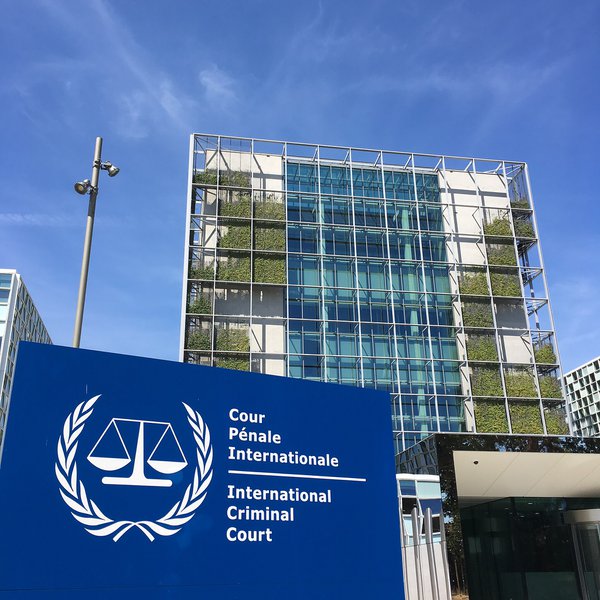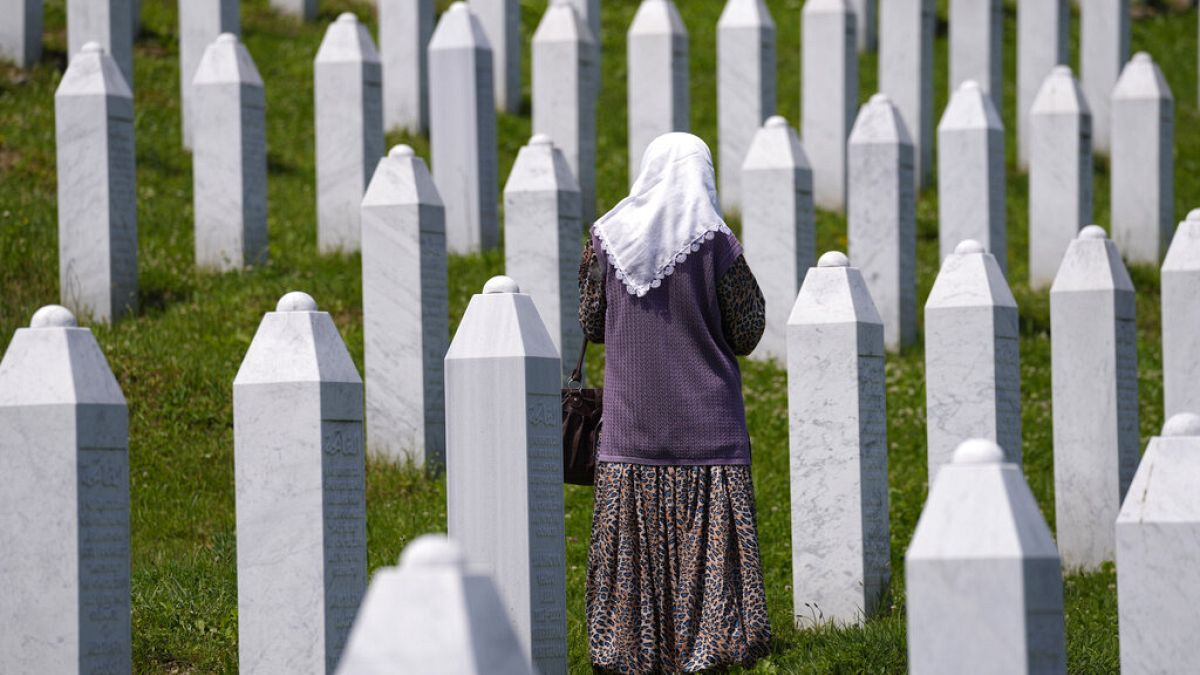Serbian government and public opinion have continued to harshly criticise the UN General Assembly's decision on Thursday to pass the resolution commemorating the 1995 genocide in Srebrenica. Why is this the case?
UN approves annual commemoration of 1995 Srebrenica genocideMeanwhile, its proponents highlight that the resolution is solely meant to commemorate the victims of the July 1995 events in the eastern Bosnian town.
The document is comparable to the UN resolution designating 7 April as the International Day of Reflection on the 1994 Genocide against the Tutsi in Rwanda.
Germany and Rwanda, the two countries that proposed and drafted the settlement on the Tutsi massacre approved by the UNGA in 2018, were the main co-sponsors of the Srebrenica resolution.
Serbian political context
As Serbia prepares to hold key local elections on 2 June — including who will rule over Belgrade — Bosnia and Kosovo are still crucial factors in the public political debate of the Western Balkans country.
Serbian conservative President Aleksandar Vučić's reluctance to join the EU sanctions against Russia over its war in Ukraine has also contributed to strained relations between his country on the one side and the EU, the US and some of its neighbours on the other.
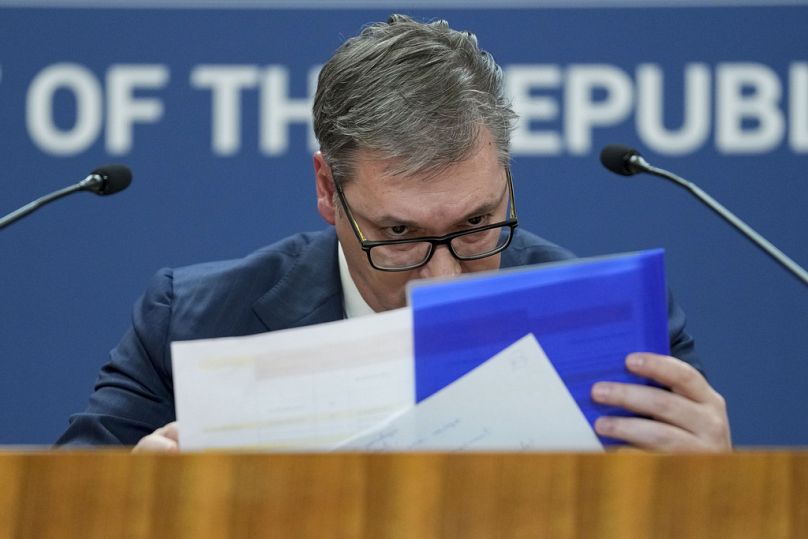
Serbian President Aleksandar VucicDarko Vojinovic/Copyright 2024 The AP. All rights reserv
Serbia's potential EU membership could be put on hold, while according to various opinion polls, Euroscepticism in the Balkan country has prevailed over the blossoming Europhilia of the early 2000s.
Whether this is a reaction to the enlargement blues outspokenly displayed by some in the EU or a genuine national sentiment, in the eyes of some in Serbia, hesitance toward the West is a part of pushback against its many demands.
Former Yugoslavia and international justice
The verdicts from the International Criminal Tribunal for the former Yugoslavia (ICTY) and the International Court of Justice (ICJ) clearly established the personal responsibility of individuals and concrete military units and made a distinction between those and any collective actors, such as Serbia and the Republika Srpska — the Serb-majority entity of Bosnia — and the genocide in Srebrenica.
Serbia initially started to take steps and recognise the rulings at home. In 2010, the country's National Assembly adopted its own Resolution on Srebrenica based on the ICJ's verdict, but without explicitly mentioning genocide. Then, in 2015, President Vučić went to Srebrenica to pay tribute to the victims.
Meanwhile, the text of the UN resolution commemorating the Srebrenica genocide excludes the Serbian collective responsibility for the "Bosnian Genocide" thanks to a Montenegrin amendment.

Supporters of Bosnian Serb political leader Milorad DodikRadivoje Pavicic/Copyright 2024 The AP. All rights reserved
"Serbia is afraid that the resolution could be misused at the international fora, and it could become 'evidence' that the Serbian nation, the Serb people and the Republika Srpska bear the responsibility for the genocide, Serbian legal expert Milan Antonijević said.
"When one reads the text of the resolution, one realises that without any doubt, it is condemning the genocide in Srebrenica and not linking it to any of the nations involved (in the conflict). But the legal level and its wording are one thing, and the political PR is another."
During the Bosnian war, over the course of three days around 11 July 1995, the Bosnian Serb army of the Republika Srpska killed 8,000 Bosniak men and boys despite the area having been officially designated by the UN as a “safe area” for civilians.
Those units were under the military orders of General Ratko Mladić and the political leader of the former president of the Republika Srpska, Radovan Karadžić.

banners of the former Bosnian Serb leaders Radovan Karadzic and Ratko MladicAndrej Cukic/AP
A considerable number of Bosnian Serb officials, both army officers and politicians, were condemned by the ICTY for war crimes, crimes against humanity and genocide. Both Mladić and Karadžić were sentenced to life for genocide, among other counts.
It was the first time in Europe since World War II and the Nuremberg trials against Nazi German top officials that an international tribunal issued a verdict on genocide.
"When the Serb (political actors) accepted, reluctantly, their responsibility for the Srebrenica genocide, they believed that they were forced to do that. And if you look at their actions and their rhetoric, you do realise this reluctant acceptance of responsibility happened under a lot of pressure in a different geopolitical situation," Bosnian historian Adnan Huskić, from the Friedrich Naumann Foundation, told Euronews.
"And ever since, what they have been doing was to permanently deny that the genocide took place and used any available opportunity to rehabilitate the persons who were found guilty in front of the ICTY," Huskić said.
'Missing an opportunity to use an opportunity'
After the military and political setbacks of the 1990s and the fall of the Slobodan Milošević regime, Serbia started a process of rapprochement with the EU and the US.
At that time, Russia and China were much less assertive than they are today — the "different geopolitical context" Huskić mentions.
According to opposition politician, writer, and former Serbian Minister of Foreign Affairs Vuk Drašković, Serbia should have joined the initiative and backed the resolution.
"Unfortunately, the Serbian government missed an opportunity to use an opportunity to support this resolution on the genocide in Srebrenica, explaining that the Serbian nation further condemned crimes because Serbs, as a people, were the victims of a genocide during World War II," Drašković told Euronews.
"By paying tribute to the victims of the genocide in Srebrenica, we would have paid tribute to the Serb victims in World War II," he explained.
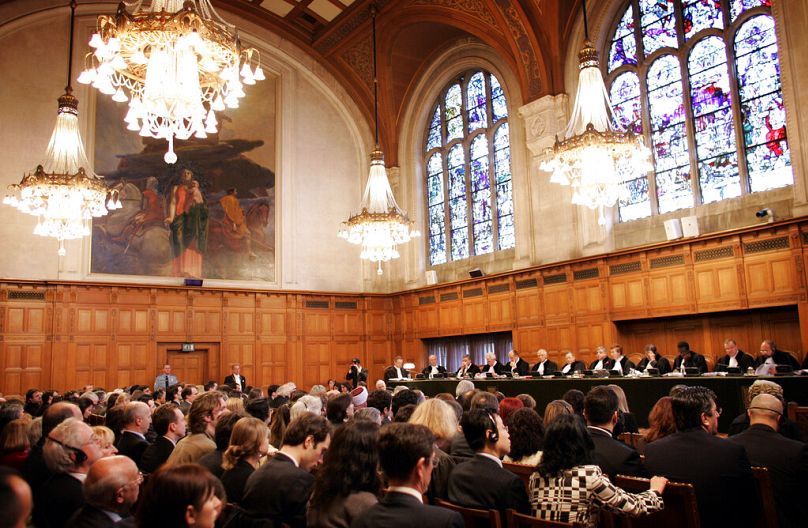
Overview of the courtroom at the International Court of Justice, also known as the World Court, in The Hague, the NetherlandsBAS CZERWINSKI/AP2007
In the early 1990s, Vuk Drašković proposed a general reconciliation among the peoples of former Yugoslavia to rebuild inter-communitarian confidence in the region through a collective recognition of the mutual and respective historical guilts for the massacres of the past. This was the central focus of his foreign and security policy, along with the full integration of Serbia into the West.
After the wars, Drašković opposed the violent dissolution of Yugoslavia and the role played by Milošević's Serbia as he participated in the democratic governments in Belgrade. As the head of Serbian diplomacy, he established the basis for his country's EU membership application and a clear path to softening relations with NATO.
Unresolved Bosnian question
Nevertheless, more than thirty years have passed since the end of the war, and the question of the future of Bosnia and the delicate balance between the three main ethnic communities is still a source of concern in the region.
The key to the complex and complicated political system can be traced back to the 1995 US-brokered Dayton Agreement, which put an end to the bloodshed between Bosnian Serbs, Croats and Bosniaks, turning Bosnia into a de facto protectorate of the international community.
Last month, Vučić criticised the draft resolution, saying it should have been presented at the UN Security Council rather than in front of the UN General Assembly because the "region is not stabilised yet".
A constitutional reform could have revised the strict political separation among the Bosnian communities established by the Dayton Peace Accords and eliminated mechanisms that blocked almost all decision-making processes along ethnic lines — the root cause of all divisive politics in the country.
Nevertheless, after decades of attempts, the process collided with the new political instability generated by the Russian war in Ukraine.
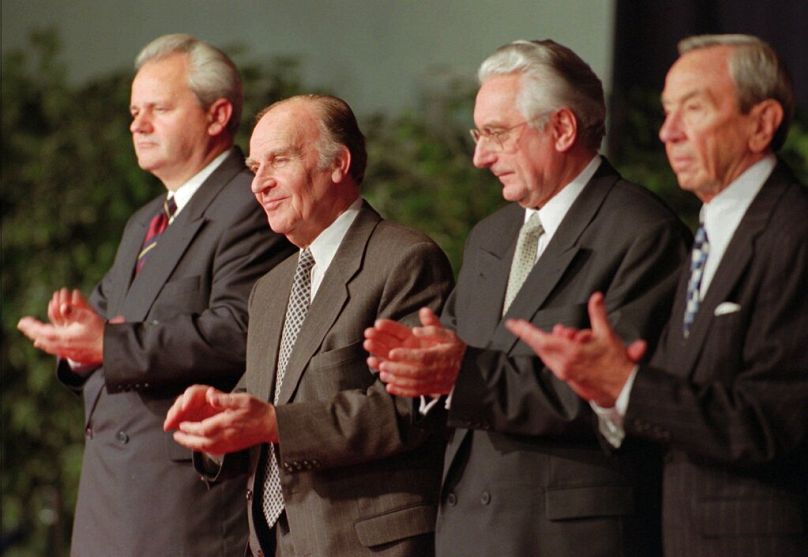
from left, Serbian President Slobodan Milosevic, Bosnian President Alija Izetbegovic, Croatian President Franjo Tudjman and U.S. Secretary of State Warren ChristopherJoe Marquette/AP
"I don't think that there is an overwhelming will to replace the current communitarian power-sharing system. I don't see the actors that could push the process forward," commented Huskić.
I don't think that there is either a regional or a global environment favourable to that move. The process is going in another direction, and I think Bosnia is becoming more communitarian than before. The constitutional reform has stalled," he concluded.
Serbia, Bosnia and the war in Ukraine
The Ukrainian war and its spillover have deeply influenced the situation in Central and Eastern Europe and reignited the unresolved conflicts between old adversaries.
"I cannot forget the very wrong message conveyed by the Serbian Orthodox Church that Russians, whatever they are doing, must be supported by the Serbs because they are our Orthodox brothers. This is why the (Serb Orthodox) Church did not condemn the Russian aggression on Ukraine," Drašković said.
The Serbian government believes that German diplomacy, led by Foreign Minister Annalena Baerbock, seems to be putting more pressure on Belgrade than other countries on many issues, from Kosovo to Russia and Bosnia. Germany was the co-sponsor of the UN resolution on the Srebrenica genocide, after all.
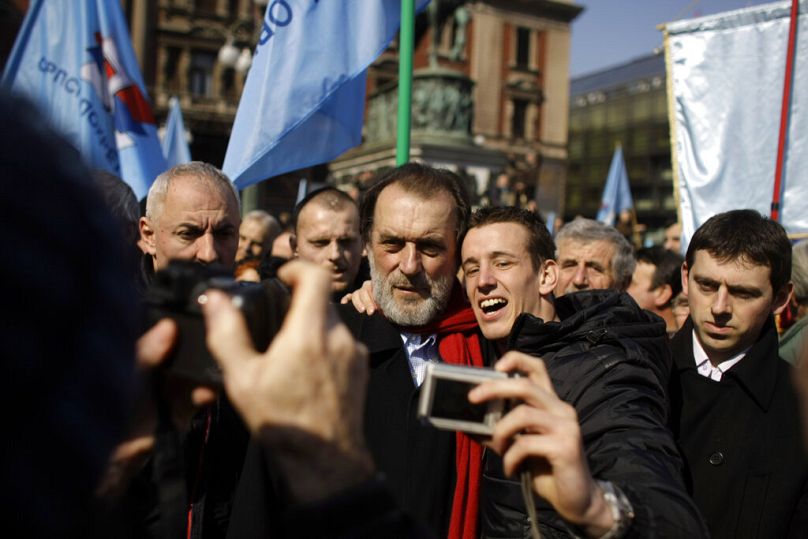
Vuk Draskovic, center, the veteran charismatic Serbian opposition leader,Joe Marquette/AP
"I think that the German foreign policy since Angela Merkel stepped down is much harsher towards Serbia," Antonijević said.
"It is true that Germany is still supporting the accession of Belgrade to the EU and investing huge (amounts of) money in Serbia. Yet, Berlin should coordinate more with Belgrade, especially because next year, 2025, will mark the 30th anniversary of Srebrenica," argues Milan Antonijević.
The international community's high representative — the peace watchdog in Bosnia — is a top German official, Christian Schmidt.
Early this year, he drafted the so-called "integrity package" for Bosnia and Hercegovina, a set of reforms concerning electoral transparency and anti-fraud systems with rules supposed to introduce ineligibility for the war criminals to honour the EU Enlargement requests.
The head of the Republika Srpska, Milorad Dodik, opposed the "integrity package" and threatened the secession of the Serbian entity from the rest of the country if it were forced to implement it. He has also repeatedly rejected Schmidt's authority — granted to him by the UN — labelling him as a "German occupier".
Dodik is the only top official from a European country who has repeatedly visited Russian President Vladimir Putin in Moscow since February 2022.
Russia's meddling to be addressed?
As a long-time opposition stalwart, Drašković thinks that the current Serbian establishment is not fit to rule the country in the years to come and that there are still many unresolved questions in Belgrade.
"Russia is doing everything to open a Balkan front. It wants a Balkan front. It can do it because it controls the security structures of the Serbian state," denounced Drašković.
"The EU missed the opportunity to make the rulers of Serbia open the files about the activities of the Russian security services in Serbia. The European Commission's obligation is to impose on Serbia to open those secret files. It should be a priority," he insisted.
In the end, the International Day of Reflection and Commemoration of the 1995 Genocide in Srebrenica won't make any difference, according to Drašković. "Milorad Dodik recognised that genocide fifteen years ago. He simply changed his mind", he concluded.
SEE https://plawiuk.blogspot.com/search?q=KOSOVO
Seeing the Forest for the Trees
Thesis on The Kosovo Crisis and the Crisis of Global Capitalism
(originally written May 1999, Bill Clinton set the stage for George W. to invade Afghanistan and Iraq for humanitarian purposes.)
http://plawiuk.blogspot.com/2005/01/war-whats-it-good-for-profit.html



